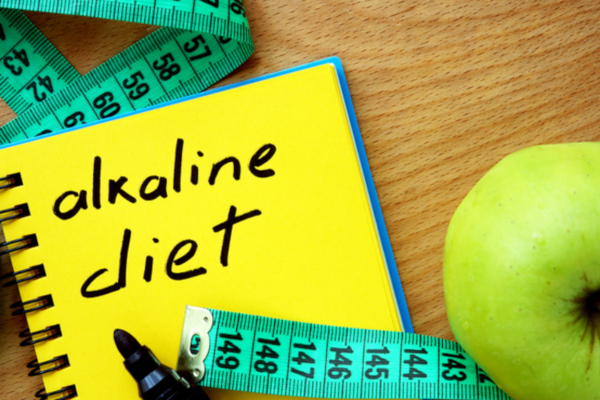There are all types of diets out there — some good, some bad — but there is perhaps no diet better for longevity and staving off disease than an alkaline diet.
A 2012 review published in the Journal of Environmental Health found that balancing your body’s pH through an alkaline diet can be helpful in reducing morbidity and mortality from numerous chronic diseases and ailments — such as hypertension, diabetes, arthritis, vitamin D deficiency, and low bone density, just to name a few. Our Pure Hydration is the most advanced and affordable all-natural, non-electric Alkaline Antioxidant Water Ionizer on the market.
How do alkaline diets work? Research shows that diets consisting of highly alkaline foods — fresh vegetables, fruits and unprocessed plant-based sources of protein, for example — result in a more alkaline urine pH level, which helps protect healthy cells and balance essential mineral levels. This can be especially important for women intermittent fasting and/or on the keto diet, as hormone levels can be altered.
Alkaline diets (also known as the alkaline ash diets) have been shown to help prevent plaque formation in blood vessels, stop calcium from accumulating in urine, prevent kidney stones, build stronger bones, reduce muscle wasting or spasms, and much more.
What Is an Alkaline Diet?
An alkaline diet — also known as the alkaline ash diet, alkaline acid diet, acid ash diet, acid alkaline diet and even sometimes the pH diet — is one that helps balance the blood pH level of the fluids in your body, including your blood and urine. Your pH is partially determined by the mineral density of the foods you eat. All living organisms and life forms on earth depend on maintaining appropriate pH levels, and it’s often said that disease and disorder cannot take root in a body that has a balanced pH.
The principles of the acid ash hypothesis help make up the tenets of the alkaline diet. According to research published in Journal of Bone and Mineral Research, “The acid-ash hypothesis posits that protein and grain foods, with a low potassium intake, produce a diet acid load, net acid excretion (NAE), increased urine calcium, and release of calcium from the skeleton, leading to osteoporosis.” (2a) The alkaline diet aims to prevent this from happening by carefully taking food pH levels into consideration in an attempt to limit dietary acid intake.
Although some experts might not totally agree with this statement, nearly all agree that human life requires a very tightly controlled pH level of the blood of about 7.365–7.4. As Forbe’s Magazine puts it, “Our bodies go to extraordinary lengths to maintain safe pH levels.” (3) Your pH can range between 7.35 to 7.45 depending on the time of day, your diet, what you last ate and when you last went to the bathroom. (4) If you develop electrolyte imbalances and frequently consume too many acidic foods — aka acid ash foods — your body’s changing pH level can result in increased “acidosis.”
Wondering what exactly “pH level” even means?
What we call pH is short for the potential of hydrogen. It’s a measure of the acidity or alkalinity of our body’s fluids and tissues. It’s measured on a scale from 0 to 14. The more acidic a solution is, the lower its pH. The more alkaline, the higher the number is. A pH of around 7 is considered neutral, but since the optimal human body tends to be around 7.4, we consider the healthiest pH to be one that’s slightly alkaline, and pH levels vary throughout the body, with the stomach being the most acidic region.
Even very tiny alterations in the pH level of various organisms can cause major problems. For example, due to environmental concerns, such as increasing CO2 deposition, the pH of the ocean has dropped from 8.2 to 8.1 and various life forms living in the ocean have greatly suffered. The pH level is also crucial for growing plants, and therefore it greatly affects the mineral content of the foods we eat. Minerals in the ocean, soil and human body are used as buffers to maintain optimal pH levels, so when acidity rises, minerals fall.
How an Alkaline Diet Works
Here’s some background on acid/alkalinity in the human diet, plus key points about how alkaline diets can be beneficial:
- Researchers believe that when it comes to the total acid load of the human diet, “there have been considerable changes from hunter gather civilizations to the present.” Following the agricultural revolution and then mass industrialization of our food supply over the last 200 years, the food we eat has significantly less potassium, Magnesium and chloride, along with more sodium, compared to diets of the past.
- Normally, the kidneys maintain our electrolyte levels (those of calcium, magnesium, potassium and sodium). When we’re exposed to overly acidic substances, these electrolytes are used to combat acidity.
- According to the Journal of Environmental Health review mentioned earlier, the ratio of potassium to sodium in most people’s diets has changed dramatically. Potassium used to outnumber sodium by 10:1, however now the ratio has dropped to 1:3. People eating a “Standard American Diet” now consume three times as much sodium as potassium on average!
- Many children and adults today consume a high-sodium diet that’s very low in not only magnesium and potassium, but also antioxidants, fiber and essential vitamins. On top of that, the typical Western diet is high in refined fats, simple sugars, sodium and chloride.
- All of these changes to the human diet have resulted in increased “metabolic acidosis.” In other words, the pH levels of many people’s bodies are no longer optimal. On top of this, many are suffering from low nutrient intake and problems such as potassium and magnesium deficiency.
- This accelerates the aging process, causes gradual loss of organ functions, and degenerates tissue and bone mass. High degrees of acidity force our bodies to rob minerals from the bones, cells, organs and tissues.
Alkaline Diet Benefits
- Protects Bone Density and Muscle Mass
Your intake of minerals plays an important role in the development and maintenance of bone structures. (5) Research shows that the more alkalizing fruits and vegetables someone eats, the better protection that person might have from experiencing decreased bone strength and muscle wasting as they age, known as sarcopenia.
An alkaline diet can help balance ratios of minerals that are important for building bones and maintaining lean muscle mass, including calcium, magnesium and phosphate. Alkaline diets also help improve production of growth hormones and vitamin D absorption, which further protects bones in addition to mitigating many other chronic diseases.
- Lowers Risk for Hypertension and Stroke
One of the anti-aging effects of an alkaline diet is that it decreases inflammation and causes an increase in growth hormone production. This has been shown to improve cardiovascular health and offer protection against common problems like high cholesterol, hypertension (high blood pressure), kidney stones, stroke and even memory loss.
- Lowers Chronic Pain and Inflammation
Studies have found a connection between an alkaline diet and reduced levels of chronic pain. Chronic acidosis has been found to contribute to chronic back pain, headaches, muscle spasms, menstrual symptoms, inflammation and joint pain.
One study conducted by the Society for Minerals and Trace Elements in Germany found that when patients with chronic back pain were given an alkaline supplement daily for four weeks, 76 of 82 patients reported significant decreases in pain as measured by the “Arhus low back pain rating scale.” (6)
- Boosts Vitamin Absorption and Prevents Magnesium Deficiency
An increase in magnesium is required for the function of hundreds of enzyme systems and bodily processes. Many people are deficient in magnesium and as a result experience heart complications, muscle pains, headaches, sleep troubles and anxiety. Available magnesium is also required to activate vitamin D and prevent vitamin D deficiency, which is important for overall immune and endocrine functioning.
- Helps Improve Immune Function and Cancer Protection
When cells lack enough minerals to properly dispose of waste or oxygenate the body fully, the whole body suffers. Vitamin absorption is compromised by mineral loss, while toxins and pathogens accumulate in the body and weaken the immune system.
Research published in the British Journal of Radiology showed that cancerous cell death (apoptosis) was more likely to occur in an alkaline body. (7) Cancer prevention is believed to be associated with an alkaline shift in pH due to an alteration in electric charges and the release of basic components of proteins. Alkalinity can help decrease inflammation and the risk for diseases like cancer — plus an alkaline diet has been shown to be more beneficial for some chemotherapeutic agents that require a higher pH to work appropriately.
- Can Help You Maintain a Healthy Weight
Limiting consumption of acid-forming foods and eating more alkaline-forming foods can protect your body from obesity by decreasing leptin levels and inflammation, which affects your hunger and fat-burning abilities. Since alkaline-forming foods are anti-inflammatory foods, consuming an alkaline diet gives your body a chance to achieve normal leptin levels and feel satisfied from eating the amount of calories you really need.
How to Eat an Alkaline Diet
Here are some key tips for following an alkaline diet:
Whenever possible, try to buy organic alkaline foods. Experts feel that one important consideration in regard to eating an alkaline diet is to become knowledgeable about what type of soil your produce was grown in — since fruits and vegetables that are grown in organic, mineral-dense soil tend to be more alkalizing. Research shows that the type of soil that plants are grown in can significantly influence their vitamin and mineral content, which means not all “alkaline foods” are created equally.
The ideal pH of soil for the best overall availability of essential nutrients in plants is between 6 and 7. Acidic soils below a pH of 6 may have reduced calcium and magnesium, and soil above a pH of 7 may result in chemically unavailable iron, manganese, copper and zinc. Soil that’s well-rotated, organically sustained and exposed to wildlife/grazing cattle tends to be the healthiest.
If you’re curious to know your pH level before implementing the tips below, you can test your pH by purchasing strips at your local health food store or pharmacy. You can measure your pH with saliva or urine. Your second urination of the morning will give you the best results. You compare the colors on your test strip to a chart that comes with your test strip kit. During the day, the best time to test your pH is one hour before a meal and two hours after a meal. If you test with your saliva, you want to try to stay between 6.8 and 7.2.
Best Alkaline Foods:
- Fresh fruits and vegetables promote alkalinity the most. Some of the top picks include mushrooms, citrus, dates, raisins, spinach, grapefruit, tomatoes, avocado, summer black radish, alfalfa grass, barley grass, cucumber, kale, jicama, wheat grass, broccoli, oregano, garlic, ginger, green beans, endive, cabbage, celery, red beet, watermelon, figs and ripe bananas.
- All raw foods: Ideally try to consume a good portion of your produce raw. Uncooked fruits and vegetables are said to be biogenic or “life-giving.” Cooking foods depletes alkalizing minerals. Increase your intake of raw foods, and try juicing or lightly steaming fruits and vegetables.
- Plant proteins: Almonds, navy beans, lima beans and most other beans are good choices.
- Alkaline water: Alkaline water has a pH of 9 to 11. Distilled water is just fine to drink. Water filtered with a reverse osmosis filter is slightly acidic, but it’s still a far better option than tap water or purified bottled water. Adding pH drops, lemon or lime, or baking soda to your water can also boosts its alkalinity.
- Green drinks: Drinks made from green vegetables and grasses in powder form are loaded with alkaline-forming foods and chlorophyll. Chlorophyll is structurally similar to our own blood and helps alkalize the blood.
- Other foods to eat on an alkaline diet include sprouts, wheatgrass, kamut, fermented soy like natto or tempeh, and seeds.
Anti-Alkaline Foods and Habits:
Foods that contribute most to acidity include:
- High-sodium foods: Processed foods contain tons of sodium chloride — table salt — which constricts blood vessels and creates acidity.
- Cold cuts and conventional meats
- Processed cereals (such as corn flakes)
- Eggs
- Caffeinated drinks and alcohol
- Oats and whole wheat products: All grains, whole or not, create acidity in the body. Americans ingest most of their plant food quota in the form of processed corn or wheat.
- Milk: Calcium-rich dairy products cause some of the highest rates of osteoporosis. That’s because they create acidity in the body! When your bloodstream becomes too acidic, it will steal calcium (a more alkaline substance) from the bones to try to balance out the pH level. So the best way to prevent osteoporosis is to eat lots of alkaline green leafy veggies!
- Peanuts and walnuts
- Pasta, rice, bread and packaged grain products
What other kinds of habits can cause acidity in your body? The biggest offenders include:
- Alcohol and drug use
- High caffeine intake
- Antibiotic overuse
- Artificial sweeteners
- Chronic stress
- Declining nutrient levels in foods due to industrial farming
- Low levels of fiber in the diet
- Lack of exercise
- Excess animal meats in the diet (from non-grass-fed sources)
- Excess hormones from foods, health and beauty products, and plastics
- Exposure to chemicals and radiation from household cleansers, building materials, computers, cell phones and microwaves
- Food coloring and preservatives
- Over-exercise
- Pesticides and herbicides
- Pollution
- Poor chewing and eating habits
- Processed and refined foods
- Shallow breathing
Precautions About an Alkaline Diet
Certain foods on the “highly acidic list” might surprise you, such as eggs and walnuts. These might be acidic in your body, but don’t let that scare you away from eating them. They contain a host of other health benefits like antioxidants and omega-3 fatty acids, which still makes them valuable.
The bottom line is that a healthy balance is what we’re shooting for. As far as your pH is concerned, it’s possible to become too alkaline, and having someacidic foods is both expected and healthy. Our problem is more a matter of not taking in enough alkaline-promoting foods rather than taking in too many acids from healthy, whole foods. Eat a variety of real, whole foods (especially vegetables and fruit) and limit consumption of packaged items, and you’ll be on your way.
Final Thoughts on an Alkaline Diet
- An alkaline diet is one that includes whole foods that have positive effects on pH levels of the blood and urine.
- Benefits of an alkaline diet can include better heart health, stronger bones, decreased pain and reversal of nutrient deficiencies.
- Foods that are emphasized as part of an alkaline diet include whole fruits and vegetables, raw foods, green juices, beans, and nuts.
- Foods that are acidic and therefore limited on an alkaline diet include high-sodium foods, processed grains, too much meat and animal protein, added sugars, and conventional milk.






